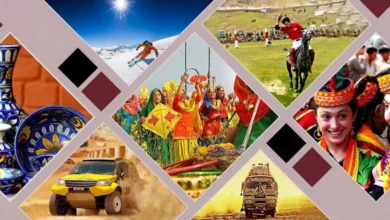Festivals in Pakistan That Tourists Can Enjoy
A Celebration of Culture and Tradition

1. Basant Festival (Kite Festival)
Location: Lahore, Punjab
When: February (Spring)
Highlights: Basant is one of the most colorful festivals celebrated in Pakistan, particularly in Lahore. The festival marks the arrival of spring with vibrant kite-flying competitions. The skies are filled with brightly colored kites, and the rooftops are buzzing with music, food, and excitement. Tourists can take part in kite flying, experience local Punjabi food, and enjoy the traditional music and dances associated with Basant.
Tips for Tourists:
Be aware that kite flying was temporarily banned due to safety concerns, but certain areas celebrate the festival on private rooftops with special permissions.
2. Shandur Polo Festival
Location: Shandur Pass, Gilgit-Baltistan
When: July
Highlights: Shandur Polo Festival, often referred to as the “highest polo tournament in the world,” is held on the Shandur Pass at an elevation of over 12,000 feet. The festival features traditional polo matches between the teams of Chitral and Gilgit. Besides polo, tourists can enjoy folk music, traditional dances, and explore the stunning natural beauty of the region.
Tips for Tourists:
Make sure to carry warm clothing as the weather can be unpredictable, even in July. The region is remote, so tourists are advised to plan ahead.
3. Lahore Literary Festival
Location: Lahore, Punjab
When: February or March
Highlights: The Lahore Literary Festival (LLF) is a celebration of literature, art, and culture. International and local writers, intellectuals, and artists gather to discuss literature, history, politics, and culture. It also features art exhibitions, book readings, and musical performances. Tourists can interact with Pakistani authors and artists, explore Lahore’s cultural scene, and delve into thought-provoking discussions.
Tips for Tourists:
This event is ideal for those interested in literature, arts, and intellectual discussions. It is a free event open to the public.
4. Eid Festivals (Eid ul-Fitr and Eid ul-Adha)
Location: Nationwide
When: Based on the Islamic Lunar Calendar
Highlights: Eid festivals are the most significant religious celebrations for Muslims. Eid ul-Fitr marks the end of Ramadan (the fasting month), while Eid ul-Adha commemorates the willingness of Prophet Ibrahim (Abraham) to sacrifice his son. These festivals are a time of feasts, family gatherings, and charity. Tourists can witness the communal prayers, traditional clothing, festive meals, and experience the warm hospitality of Pakistanis during Eid.
Tips for Tourists:
Some shops and tourist spots may be closed on Eid days, but it’s an excellent time to experience the generosity and culture of Pakistani families.
5. Navroz Festival
Location: Gilgit-Baltistan and parts of Balochistan
When: March 21 (Spring)
Highlights: Celebrated by the Ismaili Muslim community and people in Gilgit-Baltistan, Navroz marks the Persian New Year and the arrival of spring. The festival includes music, dances, local sports, and grand feasts. Tourists visiting the northern regions of Pakistan during Navroz can experience the vibrant local culture and traditional celebrations against the stunning backdrop of the Karakoram mountains.
Tips for Tourists:
It’s a great time to explore the unique cultures of Gilgit-Baltistan, with plenty of opportunities for trekking and sightseeing.
6. Sindh Cultural Festival
Location: Karachi, Sindh
When: February
Highlights: The Sindh Cultural Festival celebrates the rich heritage and traditions of Sindh, one of Pakistan’s oldest regions. The festival showcases Sindhi music, dance, handicrafts, and traditional Sindhi food. Tourists can enjoy a cultural immersion in the unique Sindhi art forms, fashion, and heritage sites such as Mohenjodaro and Makli Necropolis.
Tips for Tourists:
Make sure to visit the exhibitions displaying local handicrafts, and don’t miss the Sindhi Ajrak (traditional block-printed shawl) stalls.
7. Kalash Festival
Location: Kalash Valleys, Chitral, Khyber Pakhtunkhwa
When: May (Joshi Festival), August (Uchal Festival), December (Chomos Festival)
Highlights: The Kalash people, an indigenous tribe residing in the remote valleys of Chitral, celebrate their unique festivals with much enthusiasm. The Joshi Festival celebrates the arrival of spring, while the Uchal Festival is dedicated to the harvest season, and Chomos marks the arrival of winter. Tourists visiting during any of these festivals will witness colorful parades, traditional Kalash dances, and songs, as well as vibrant cultural practices that have been preserved for centuries.
Tips for Tourists:
Respect the local traditions and customs when visiting the Kalash Valleys. The area is remote, so prepare for long journeys.
8. Independence Day (14th August)
Location: Nationwide
When: August 14
Highlights: Pakistan’s Independence Day is celebrated with patriotic fervor. Cities are decorated with flags, lights, and banners, and there are parades, fireworks, and cultural performances. Major landmarks like the Minar-e-Pakistan in Lahore and Mazar-e-Quaid in Karachi become the focus of celebrations. Tourists can participate in the festivities, explore historical sites, and enjoy the lively atmosphere.
Tips for Tourists:
This is a national holiday, so expect large crowds in popular places, but it is an exciting time to be in Pakistan to experience the country’s patriotic spirit.
Conclusion
Pakistan offers a diverse range of festivals that cater to various interests, whether you’re into cultural heritage, sports, literature, or religious experiences. Each festival is a gateway to the vibrant traditions, warm hospitality, and rich history that Pakistan offers to its visitors. For tourists, these festivals provide a wonderful opportunity to interact with locals, immerse themselves in the culture, and create memorable experiences



